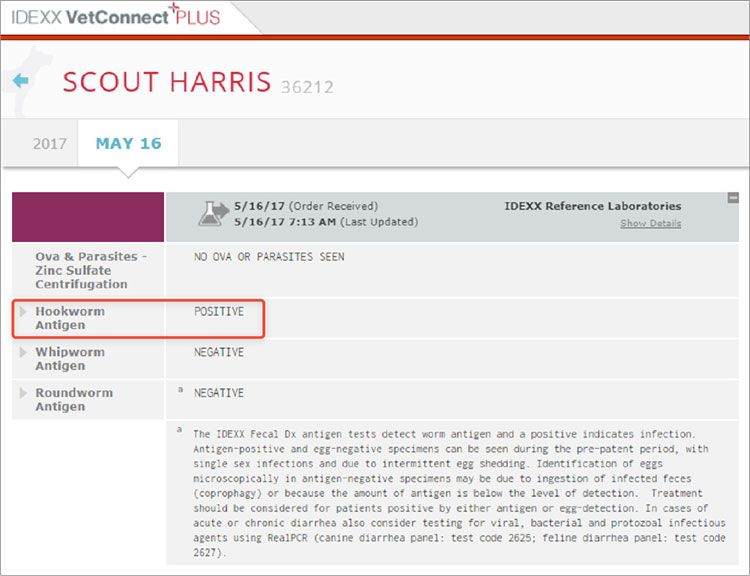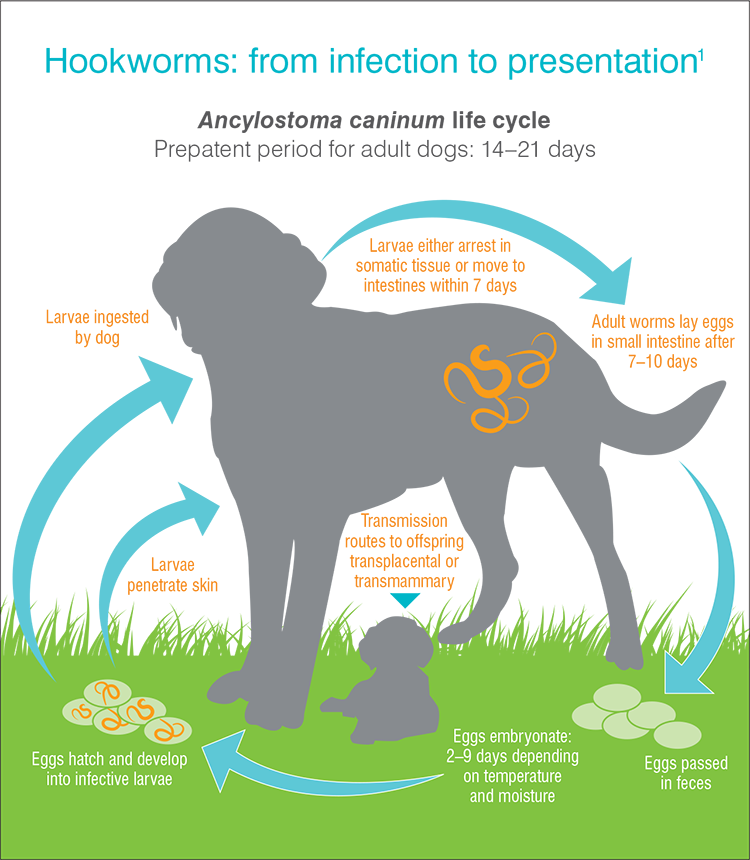Fecal Dx antigen testing
Case study: Scout
Intestinal parasite antigen testing helps veterinarians find infections the microscope may miss

Background information
Name: Scout
Age: 4 years
Breed: German shorthair pointer mix
Gender: Neutered male
Presenting reason
Scout presented for annual examination, wellness testing, and vaccinations.
History
His owners reported that he seemed healthy but requested his ears to be checked since he had been swimming regularly in the lake and had experienced ear problems in the past. He was receiving monthly heartworm prevention with a dewormer.
Physical examination
Scout was bright, alert, and responsive. He weighed 62.4 lb and had a body condition score of 3/5. His temperature was 100.8°F. Oral examination revealed grade 2/4 gingivitis and periodontal disease. He also had lower lid entropion of the left eye.
Diagnostic plan
For Scout, as with other patients of similar age and observations, the following diagnostics along with a physical examination provided a good clinical picture:
- Chemistry panel, including the IDEXX SDMA Test and electrolytes
- Complete blood count (CBC)
- SNAP Heartworm RT Test
- Fecal Dx Antigen Profile (includes fecal ova and parasites and fecal antigen testing)
- SNAP cPL Test
Diagnostic review
- Chemistry panel and CBC results were within normal limits.
- SNAP Heartworm RT Test was negative.
- No parasites or eggs were seen on the fecal ova and parasites test; however, the hookworm antigen test was positive, indicating the presence of parasites. Scout was diagnosed with a hookworm infection.
Possible next steps
- Treat with approved anthelmintic.
- Minimize risk of reinfection by promptly picking up feces, per veterinarian’s recommendation.
- Maintain a monthly heartworm preventive containing a dewormer year-round to reduce the risk of reinfection and environmental contamination.
Since Scout had been healthy and maintained on a broad-spectrum monthly control product, retesting was not necessary.
Patient reports

Discussion
This case illustrates how an apparently healthy animal can benefit from Fecal Dx antigen testing.
For Scout, hookworm antigen was detected, an infection was present, but no ova were seen. This can occur during the parasite prepatent period and with single-sex infections, and it may be more common with some intestinal nematodes, which are notorious for intermittent egg shedding. This is where Fecal Dx antigen testing can help to overcome some of the limitations of egg detection.
Dogs receiving monthly anthelmintics effective against hookworms may test positive for antigen or have eggs detected in the feces within a 30-day time period. This is not a failure of the monthly control product but may be attributed to the relatively short prepatent period of hookworms following reinfection or the emergence of arrested larvae from the tissues.

Suggested test profiles for wellness visits
Fecal Dx Antigen Panel (test code FDX)
Hookworm, roundworm, and whipworm antigens by ELISA
Fecal Dx Antigen Panel with Lab 4Dx Plus Test—Canine (test code VF1)
Lab 4Dx Plus Test, hookworm, roundworm, and whipworm antigens by ELISA
Select Fecal Dx antigen testing during every fecal screening
Double the detection of hookworm, roundworm, and whipworm infections, earlier than ever and even when dogs appear healthy.2,3
Learn more about Fecal Dx antigen testing
References
- CAPC guidelines: hookworms. Companion Animals Parasite Council website. www.capcvet.org/guidelines/hookworms. Accessed March 28, 2019.
- Data on file at IDEXX Laboratories, Inc. Westbrook, Maine USA.
- Elsemore DA, Geng J, Flynn L, Cruthers L, Lucio-Forster A, Bowman DD. Enzyme-linked immunosorbent assay for coproantigen detection of Trichuris vulpis in dogs. J Vet Diagn Invest. 2014;26(3):404–411.